WEDNESDAY, APR 03, 2019
Political Disruption brings you insights on how the fast-changing global political environment is creating political disruption of business.
Greetings!
Today, more trouble between China and Canada, potential risk for foreign firms in Cuba, more sanctions from all over the world, a glimmer of hope for the isolation of Qatar and increasing tensions over Taiwan.
Hans Diels
Editor
1. China targets Canadian firm
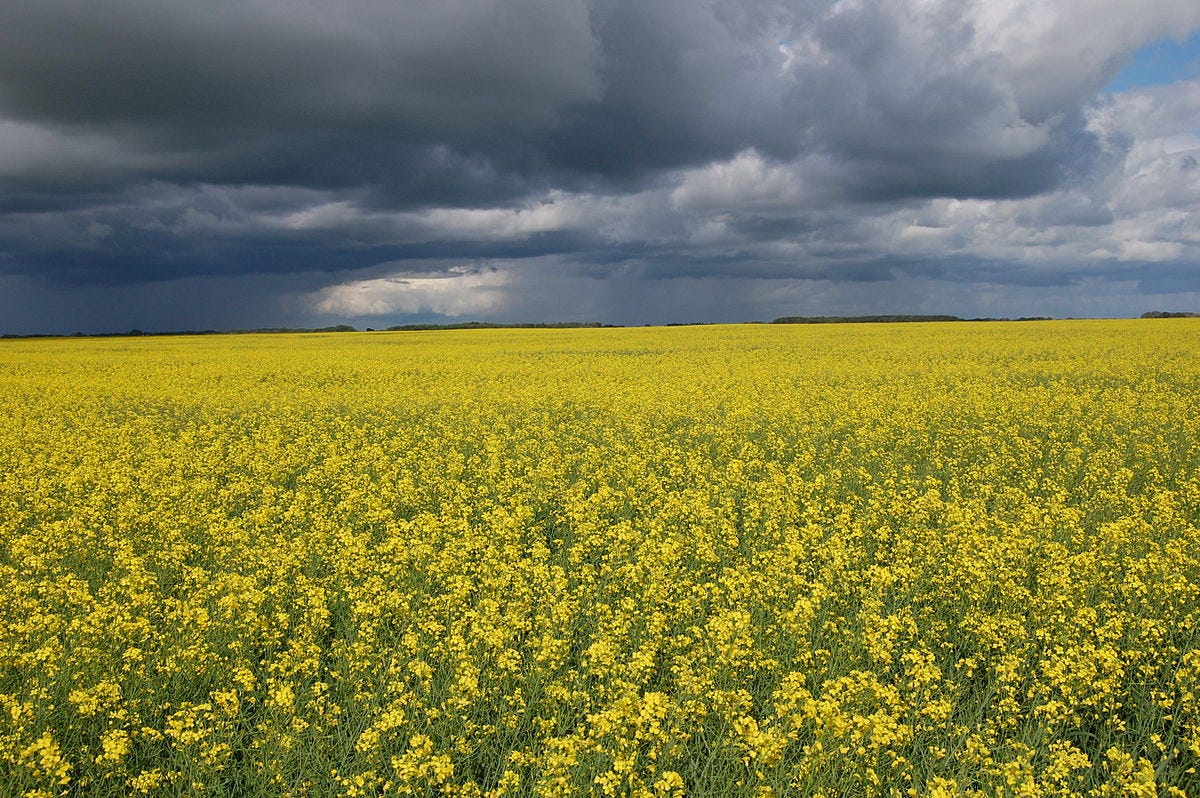
Blooming Canola field (Brassica napus), located in East Central Saskatchewan. Photo: Nas2 [CC0]
In a further escalation of the conflict between China and Canada over the detention of Huawei CFO Meng Wanzhou, China banned canola imports from Richardson International.
The official reason: The largest Canadian grain processor lost its permit to import in China because hazardous pests were found. According to a spokesperson of China’s Ministry of Foreign Affairs, China detected frequently “hazardous pests in imports of Canadian canola, and in one company’s imports the problem was particularly serious.”
A more probable explanation: Richardson was the only wholly Canadian owned firm that exports canola to China and no other Canadian canola exporters have been affected. China has a history of using food and health safety measures politically. In a dispute with the Philipines over conflicting territorial claims in the South China Sea, China suddenly restricted banana imports. In a more recent conflict with South Korea over the deployment of a THAAD missile shield, it targetted the Lotte supermarket chain with fire safety inspections, forcing Lotte to close its shops definitely in China.
What to look out for: As long as Canada detains Meng Wanzhou, we can expect tensions to rise, and there’s a high probability that China will target other Canadian exporters by this kind of ‘informal’ measures. An alternative for the Chinese is the instigation of consumer boycotts as they happened a few months ago when Chinese websites called for the boycotting of Canadian brands. However, this didn’t stop Chinese consumers to flock to the opening of the first Canada Goose flagship store.
2. Risk for foreign firms in Cuba
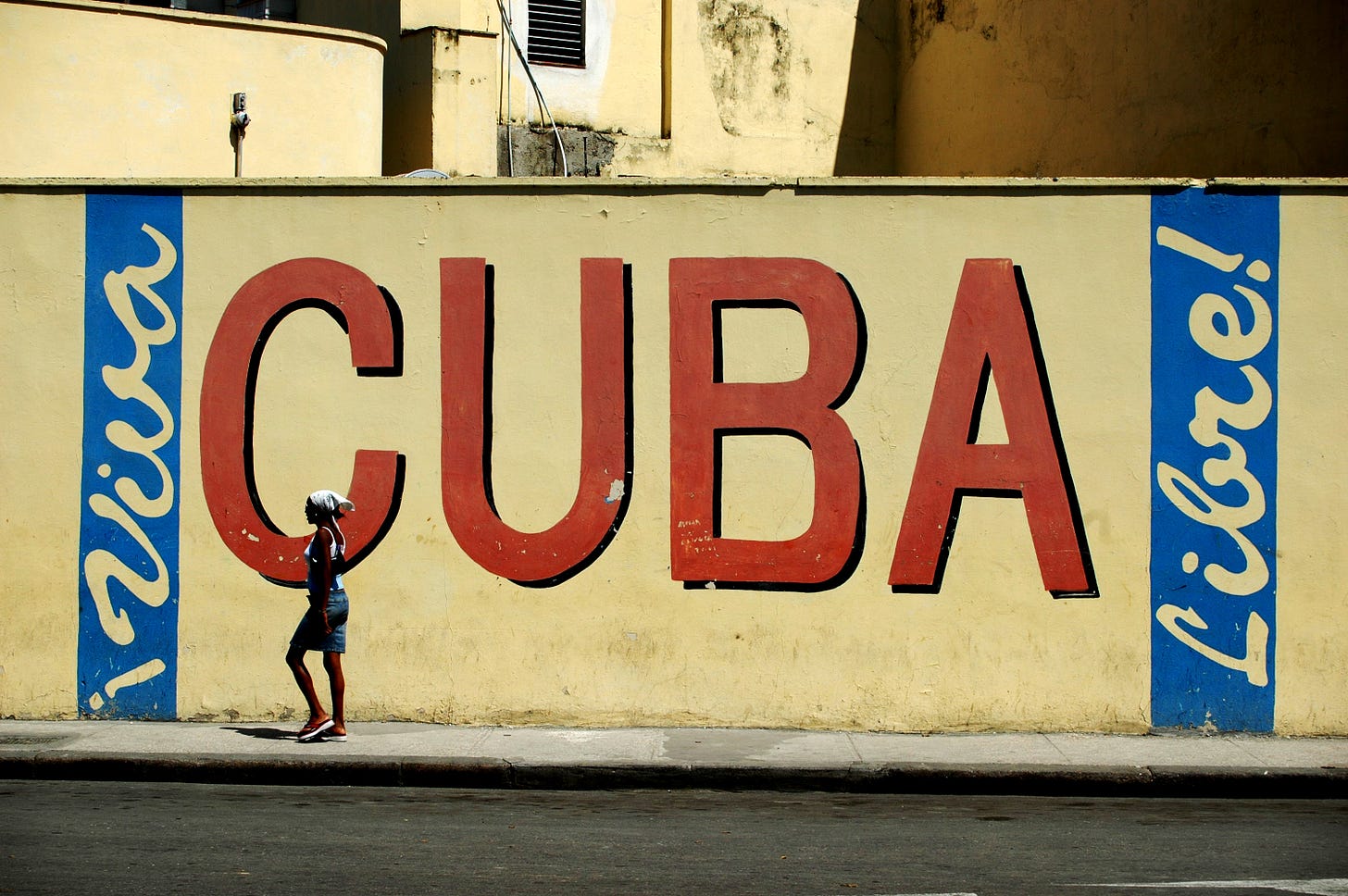
Political Propaganda, Cuba. Photo: Gorupdebesanez
The Trump administration declared that from March 19 lawsuits against Cuban firms will be permitted in U.S. courts.
What’s the legal base? This decision is based on the Cuban Liberty and Democratic Solidarity (Libertad) Act of 1996. This law, better known as Helms-Burton, has held a section (Title III) that allows citizens and firms whose properties were confiscated during the Cuban revolution of 1959 to sue for compensation in U.S. courts. However subsequent U.S. Presidents have suspended this clause every six months since then.
Secretary of State, Mike Pompeo declared:
“We encourage any person doing business in Cuba to reconsider whether they are trafficking in confiscated property and abetting this dictatorship,”
Further toughening on Cuba. The Trump administration has reversed the policy of rapprochement that the Obama administration launched. Obama eased restrictions on remittances and travel of U.S. citizens to Cuba. The administration also removed Cuba’s designation as a terrorism sponsor and even visited Cuba in 2016 as the first American President since Calvin Coolidge in 1928.
The election of Trump reversed this trend. National Security Advisor John Bolton declared Cuba to be part of the “troika of tyranny” together with Nicaragua and Venezuela.
What’s the risk? At this moment Title III has only been partially rolled out. A complete rollout would also allow those firms to be sued that use confiscated properties. This would create risks for European firms doing business in Cuba. The European Union’s ambassador to Havana, Alberto Navarro sees this as a way for the
Trump administration [ ] trying to create confusion… to scare off investment in Cuba. [ ] We cannot accept that a country tries to impose its laws outside its own borders… that would be a return to the jungle.
The extraterritorial effects of the Helms-Burton legislation, targetting not only U.S. firms but also foreign firms, has been a contentious issue between the EU and the U.S. since its origin and upending the suspension of Title III would only increase the already contentious nature of U.S-EU relations.
3. More sanctions news:
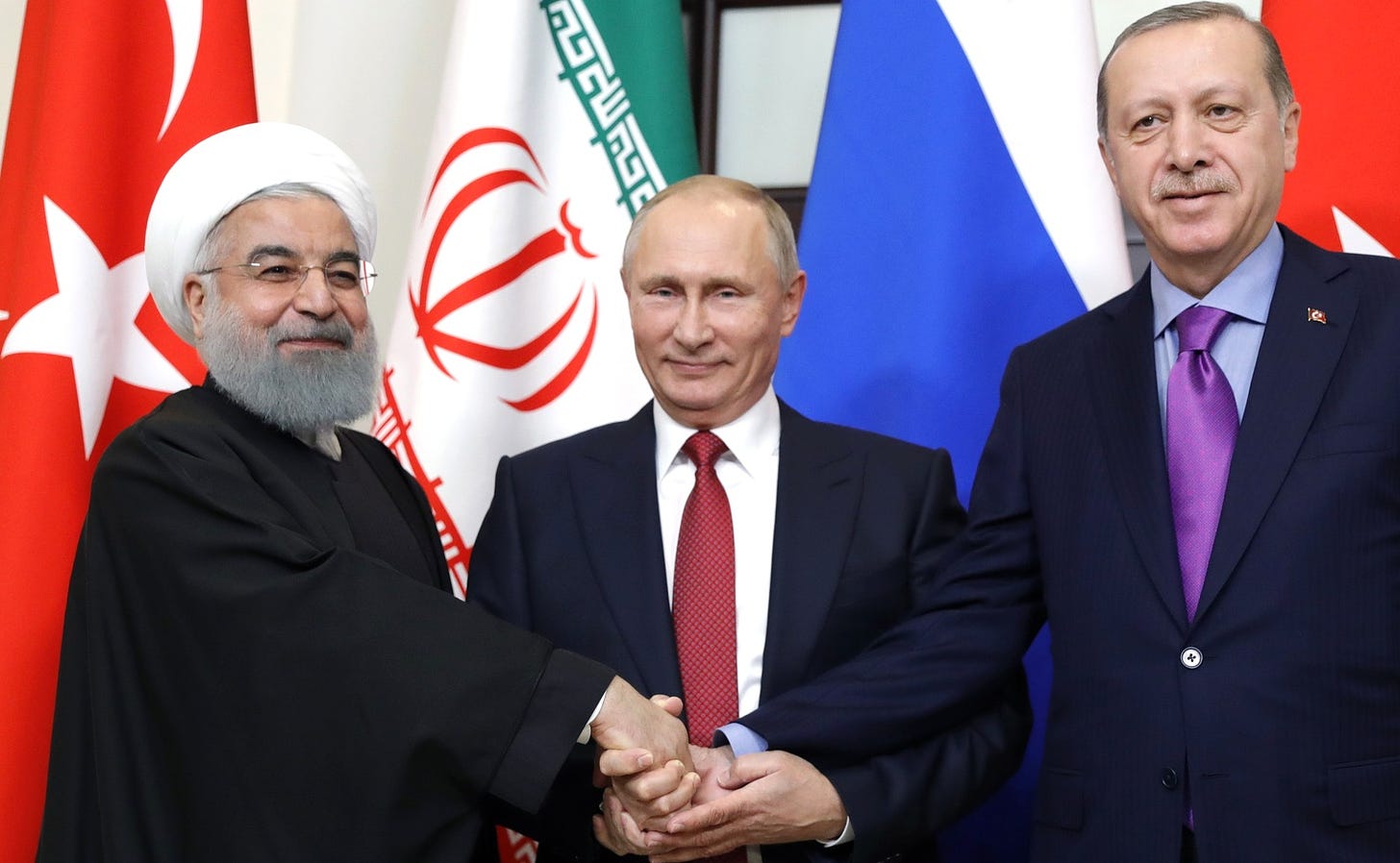
Vladimir Putin, Hassan Rouhani, Recep Tayyip Erdoğan. Photo: www.kremlin.ru
Iran: U.S Treasury Department blacklisted members of a network operating in Turkey and the United Arab Emirates helping Iran evade sanctions.
Russia: The U.S imposed sanctions on Evrofinance Mosnarbank over its dealings with Venezuela’s oil company PVDSA. The Moscow-based bank is jointly owned by a group of Russian banks and Venezuela's National Development Fund.
Russia: The U.S, EU and Canada imposed additional sanctions on Russian individuals and firms in reaction to an incident in the Kerch Strait between Russian and Ukrainian vessels in November.
Zimbabwe: The U.S also expanded its sanctions on Zimbabwe, including President Emmerson Mnangagwa and stated that it would only remove the sanctions after the easing of press restrictions and the suppression of protesters.
Congo: The U.S announced sanctions against top officials from the electoral commission for alleged corruption.
Venezuela: In a move to further cut off Maduro’s financing, the U.S Treasury imposed sanctions on Venezuela’s gold mining company Minerven and President Trump declared that he could get “a lot tougher” in the future.
4. Easing sanctions on Qatar?
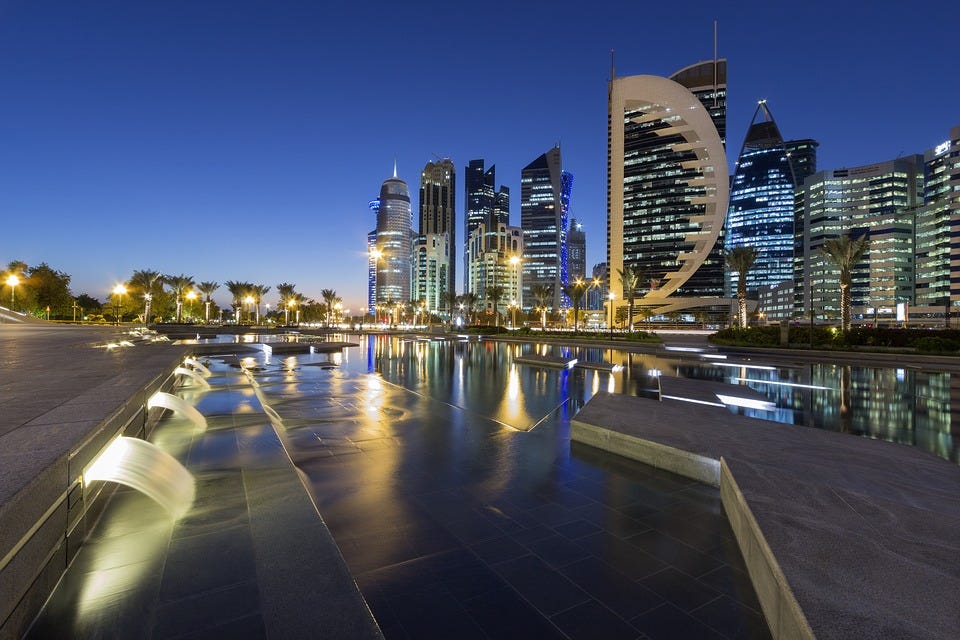
Cityscape Doha
There’s hope of a softening of tensions between Qatar and its neighbours that have imposed a complete embargo to isolate the small Gulf state.
How did it start? In June 2017, Saudi Arabia, Bahrain, the UAE and Egypt started a blockade, banning all trade and travel to Qatar. The Arab states accused the Gulf Monarchy of supporting terrorist movements and having too close links with Iran.
How did Qatar weather its isolation? Qatar, one of the wealthiest countries in the world has endured the blockade quite well, developing closer ties with Turkey, India and Iran. Turkey sent troops to the country. Iran granted overflight rights to Qatar Airways (which could no longer fly over Saudi Arabia). While Qatar has substantial means to weather the blockade, its economy has suffered. It had to spend part of its sovereign wealth fund of $340 billion to airlift supplies and to stabilize its bank, and tourism income has fallen.
In December 2018, Qatar declared that it would leave the OPEC oil cartel. Moreover, the same month the Qatari emir refused to attend the meeting of the Gulf Cooperation Council in the Saudi capital, sending a junior minister.
Troubled Prince: Meanwhile, the prestige of the Saudi Crown prince has sapped due to increasing international criticism of his handling of the war in Yemen, the Kashogi murder and his authoritarian leanings at home. He’s, at least partially, fallen from his pedestal as the man who would modernize the Saudi Kindom. This decreases his authority in the Gulf and will make it harder to unite other countries to keep the blockade. Pressure on Riyad to soften the embargo is increasing from Turkey and the US.
Softening tensions: In October 2018 the first signals of a thaw in the relations between Saudi Arabia and Qatar could be detected. The Saudi Crown Prince (and de facto ruler) Mohamed bin Salman used a surprisingly soft tone while talking about its small neighbour on an investment conference in Riyadh stating that “Even Qatar, despite our differences with them, has a very strong economy.”"
Other Gulf states have also tried to solve the crisis. Especially the Kuwaiti government has tried to mediate between Saudi Arabia and Qatar. There were also rumours that the United Arab Emirates started easing the shipping ban, but official authorities have denied this.
In February Qatar joined a military exercise with Saudi Arabia and other Gulf Cooperation Council states in Saudi Arabia, signalling a warming of the relationships in the Gulf.
My take: The conflict between Qatar and Saudi Arabia (and its partners) has lost its hard edge. A softer Saudi tone, some potential weakening of the embargo and the inclusion of Qatar in the GCC military exercises are good signs. A complete resolution of the crisis will be difficult to achieve without Saudi Arabia losing credibility. Therefore I expect that the embargo will stay in theory, but will be gently loosening up.
5. Tensions over Taiwan increase
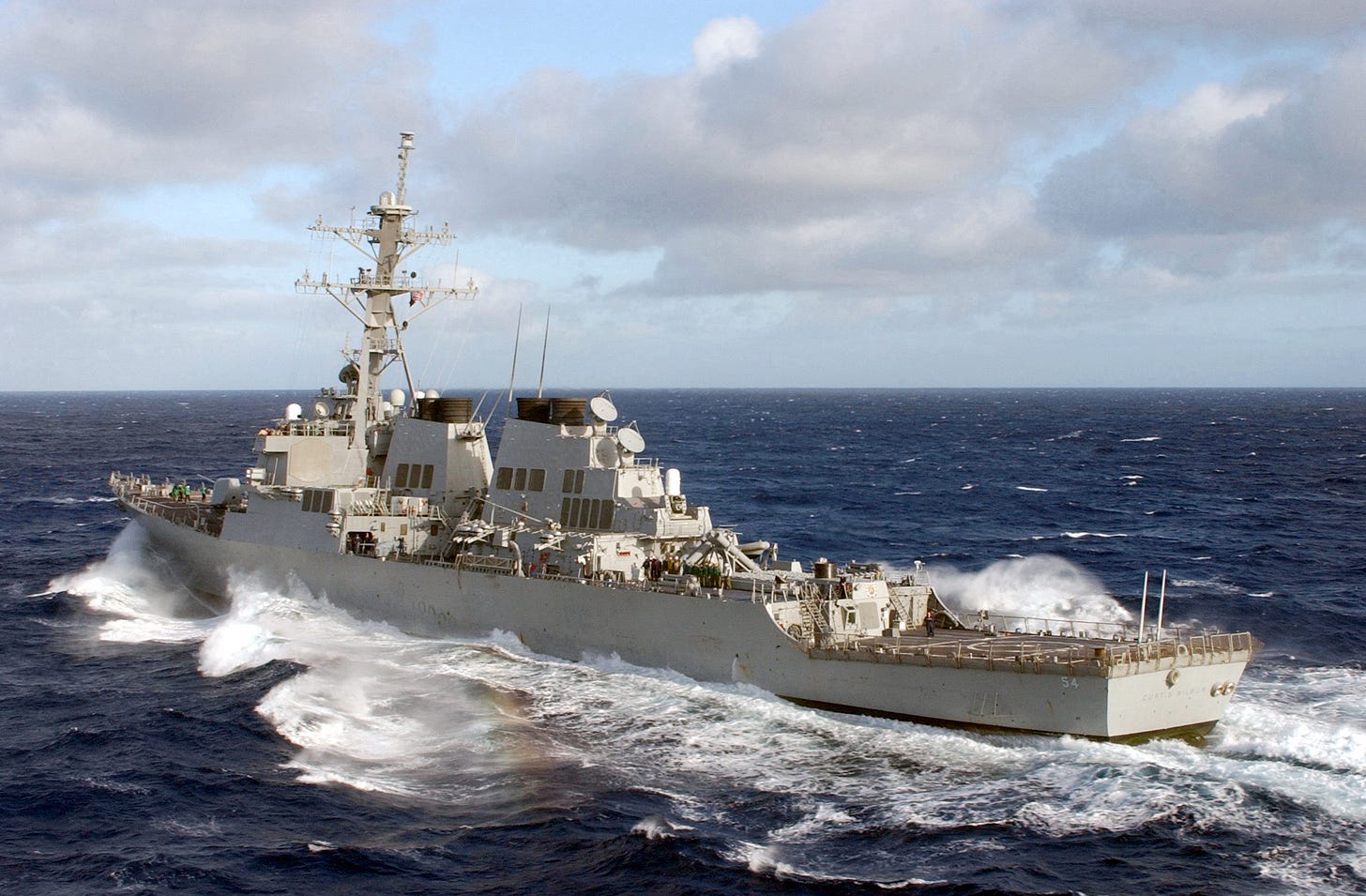
USS Curtis Wilbur (DDG-54) Nov. 01, 2002. Photo: U.S. Navy, Photographer’s Mate 3rd Class Todd Frantom
Despite calls from China to block it, the Taiwanese President, Tsai Ing-wen, visited Hawaii on March 26. A State Department spokesperson declared the visit “private and unofficial”. China has previously protested visits of Taiwanese Presidents on U.S. soil.
The visit comes amidst growing tensions between the U.S. and China over Taiwan. On March 11, two U.S. Coast Guard vessels passed through the Taiwan Strait. According to U.S. Navy spokesman Lt. Joe Keiley:
The ships’ transit through the Taiwan Strait demonstrates the U.S. commitment to a free and open Indo-Pacific. The U.S. will continue to fly, sail and operate anywhere international law allows.
Background: China’s sees Taiwan as an inherent part of its territory and any action that could be seen as support for Taiwanese independence is seen in China as a national security threat. Both Beijing and Taipei see themselves as the ‘one China’. In a Joint U.S.-Chinese communique, the U.S. acknowledged “the Chinese position that there is but one China and Taiwan is part of China” and it severed its diplomatic relations with the government in Taiwan.
Military sales: But shortly after that the U.S. Congress passed the Taiwan Relations Act (TRA) confirming strong informal relations between Washington and Taipei and assuring the supply of military material. U.S. arms sales to Taiwan have intensified tensions over the island. According to the Straits Times the Trump administration has already tacitly backed the sale of F-16 figher jets to Taiwan. This would be the first time the U.S. sold advanced fighter jets since 1992 as previous administrations have been wary to antagonise China on this sensitive issue.
Taiwan insurance act: On March 27, Republican and Democratic lawmakers introduced new legislation that according to one of the sponsors the Republican Senator Tom Cotton:
would deepen bilateral security, economic, and cultural relations, while also sending a message that China’s aggressive cross-Strait behavior will not be tolerated.
The law would, if approved, significantly increase official, commercial and military relations with the island, certainly further infuriating China. Given the history of Congressional activism on Taiwan and the fact that Donald Trump is (in contrast to his predecessors) a proponent of stronger relationships with the island. Donald Trump is the first President (or President-elect who has spoken to a Taiwanese President in office since 1979 (during his famous phone call in 2016).
Woody Island. At the same time, China is proceeding with its plan to build an island city on Woody Island in the South China Sea. China, Taiwan and Vietnam dispute sovereignty over the island. China would develop it into a “national key strategic service and logistics base” according to Zhang Jun, Communist Party secretary of the Sansha administrative unit in the Paracel islands.
Risk of accidents. In January the USS McCampbell conducted a “freedom of navigation” operation, sailing close to the Paracels, a disputed island chain in the South China Sea “to challenge excessive maritime claims” according to Pacific Fleet spokeswoman Rachel McMarr. The increased presence of U.S. warships in the region, increase the risk of collisions between the U.S and China. While neither the U.S nor China is, at this moment, looking for a full-scale confrontation, the risk of an accident that could then further escalate to all-out conflict is increasing.
Why should you care? Any escalation of a military conflict between the U.S and China would have serious repercussions for maritime transport through the South China Sea. The UN agency UNCTAD, calculated that about one third of all global shipping passes through the South China Sea. Even a minor disruption of this maritime transport route would have huge repercussions for global supply chains. This adds up to the much bigger harm that a US-China military escalation would do to the world economy.


